BIG STORY
Four Days To Polls, Naira Scarcity Grounds Economy
Published
2 years agoon
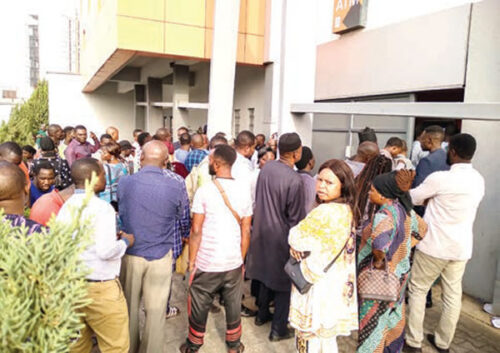
The chaos trailing the cash scarcity has assumed a worrisome dimension with the organized private sector raising the alarm that the crisis has grounded the economy.
Members of the organized private sector including the Lagos Chamber of Commerce and Industry, Nigerian Employers Consultative Forum, Nigerian Economy Summit Group, Nigerian Association of Small and Medium Enterprises, and the Nigerian Association of Small-Scale Industrialists, spoke in separate interviews with The PUNCH on Monday.
This happened as the cash scarcity sparked another round of violence in Ogun State, on Monday, resulting in the razing of two banks and the destruction of the local government council secretariat in Sagamu.
Speaking on the impact of the cash shortage on the economy, the Director-General of the Nigeria Employers Consultative Association, Wale Oyerinde said the situation had created massive disruptions in the flow of transactions, even as e-payment channels continued to fail.
Oyerinde said, “The impact is already obvious. The cash squeeze is already creating massive disruptions in the flow of transactions. The MSMEs are struggling, and the survival of the informal sector and the unbanked in the rural areas is already being compromised. We cannot pretend that all is well.
“The online banking portals and mobile infrastructure continue to fail, causing further hardship to businesses and Nigerians. While the release of the N200 notes will give some relief, it is hoped that the damage that has been done will be reversed gradually.”
On its part, the Nigerian Economic Summit Group, in a report made available to The PUNCH, said the naira redesign policy was beginning to take a toll on Nigeria as the economy suffered from a significant decline in the volume and value of cash in circulation.
The NESG further stated that the cash crunch had had adverse effects on households, informal businesses, and formal businesses, particularly the Nano, Micro, Small, and Medium Enterprises, which are the backbone of the private sector-driven economy.
The report read in part, “Long and unending queues are now common at banks as people often try unsuccessfully to withdraw cash. Time spent attempting to obtain new notes disrupts economic activities; makes it significantly difficult for people to engage in daily activities, as commuting becomes difficult or even impossible when cash is not in hand and when economic agents are not receptive to e-payment/bank transfers.”
The group also noted that the failure of deposit money banks to meet the growing demands for cash suggests that the banking system, given the existing technology, was unprepared for a sudden transition from the old naira notes to the new ones or a cashless economy.
Also, speaking with The Punch, the Deputy-President of the Lagos Chamber of Commerce expressed concern that the Gross Domestic Product for the first quarter of the year would be significantly impacted as businesses have been unable to operate at optimal levels due to the naira scarcity that has forced down consumer spending power.
According to Idahosa, the cash scarcity has been significantly exacerbated by political actors who are hoarding as much currency as they can for vote-buying during the forthcoming general elections.
He said, “It is not likely to continue for a long time. It is already having a short-term impact. Certainly, in February, national industry productivity, sales, travel, and other sectors will show reduced levels of operations. People are grounded. A significant amount of the new notes are in the hands of people who are preparing for elections, and once that objective is achieved, the money will go into circulation.’’
“Even if it was just N300bn new notes that were printed, we would not have the kind of crisis that we have now if the N300bn were circulating. Everybody that wanted N10,000 from the ATM or over-the-counter should have been able to get it.’’
Also lamenting the naira crisis, the Chairman of the Nigerian Association of Small and Medium Enterprises, Lagos State Chapter, Dr. Adams Adebayo, said it was worrisome that the naira chaos had grounded the economy, adding that the situation had had a serious negative impact on SMEs.
He said, “The crisis is uncalled for. Micro, Small, and Medium Enterprises are the worst hit by this unpopular policy of the CBN. The prices of goods have gone up and the ease of doing business is far away from us in Nigeria.
“The Federal Government should look beyond the politics of the naira redesign and focus on the damaging effects on businesses and the economy at large. The value chain in the formal and informal sectors with over N5bn cash transactions daily is almost destroyed with consequences for employment, business sustainability, and national development.’’
“It was unfortunate that too much attention has been placed on the politics of the naira redesign with the government and the Central Bank of Nigeria, shifting attention away from the damaging effect of the cash squeeze on businesses and the already fragile and damaging economy.’’
Small scale industries
However, the Vice-President of the Nigerian Association of Small-Scale Industrialists, Seun Kuti-George, said though the naira crisis would harm the economy, it was not capable of destroying the economy.
Meanwhile, the President of the Bank Customers Association of Nigeria, Dr. Uju Ogubunka, has further lamented the impact of the CBN policy on the masses.
He said, “Of course, more customers are facing hardship including myself. No matter the amount of transfer you do, you cannot buy certain goods that require cash. Most of the things you buy are in the open market.’’
In Lagos, many residents were stranded as several commercial banks failed to dispense cash.
It was gathered that most of the banks along the Okota and Ire-Akari axis in Isolo were not operational on Monday.
The First Bank located at Okota was closed and all the ATMs were not dispensing any cash while people queued to make transfers via the machines.
A bank customer who simply introduced herself as Bimbo said she got to the bank as early as 7:30 am but the bank was shut down.
The Access Bank along Ire-Akari Road was open to customers who wanted to carry out other banking activities other than cash withdrawals.
However, dozens of customers were seen hanging around the ATMs, lamenting the hardship caused by the cash crisis.
Our correspondent observed that a few people that wanted to deposit their old N500 and N1000 notes were not attended to by the bank.
Likewise, none of the Sterling Bank, Fidelity Bank, and Ecobank located along the Isolo axis was disbursing money to customers when our correspondent visited.
They also did not accept the old notes.
At the Old Ojo area of Mazamaza and Festac, the banks shut out their customers.
Our correspondent who went to seven bank branches in that part of town observed small crowds at the entrance of the banks.
At the Union Bank branch at Mazamaza, a banker said that the branch was closed as of 12:59 pm.
She, however, revealed that they were collecting old notes below N500,000 provided the customer has the code generated from the CBN website.
But the First Bank also in Mazamaza refused to let customers in, which angered some individuals.
However, the Access Bank branches on the stretch of the road were opened to customers. One of them also put up a notice advising customers about the deposit of the old notes.
A branch of Fidelity Bank in the area was accepting old notes below N500,00 from customers who have the CBN code.
At Polaris Bank, First Gate side of Festac, a fight nearly broke out among the customers over who gets into the bank first.
While some said that access should be granted based on the tally they had been given, others insisted they should be let because they were in the queue.
At the Zenith Bank opposite the Polaris Bank, customers were routinely allowed into the premises but many failed to get into the banking hall. None of the ATMs at the banks visited was dispensing.
Meanwhile, at the Union Bank branch in Mazamaza, a customer, Nnaji Emmanuel, said he had been coming to that branch since early February after a transaction of N148,850 he did via Point of Sale failed.
Most of the banks located at Ogunnusi Road, Ojodu-Berger axis of Lagos State were not attending to customers on Monday.
ATMs fail
At the First Bank, our correspondent was not allowed entry into the banking hall, as the security guards insisted that only customers looking to make either cash or deposit cheques would be allowed inside.
Union bank, on the other hand, locked its gate, completely denying customers access to the banking hall.
The bank’s ATMs, which were besieged by customers, did not dispense cash.
At Access and Eco Bank, the banking halls were open to the customers looking to make deposits, but both bank did not dispense any cash either over-the-counter or via ATMs.
The security guards at Zenith Bank said the bank was not attending to customers due to network failure.
The story was not different at GTB where our correspondent was again denied entry into the banking hall because the bank’s personnel had concluded customer-related requests for the day.
A senior official at Sterling Bank, who did not want to be named, explained that all of the bank’s branches within the Lekki-Ajah axis were open, but were only collecting deposits of old notes as the bank did not have any cash.
In Abuja, the nation’s capital, most ATMs were dormant on Monday as they had no cash to dispense.
Also, the DMBs, which were besieged by thousands of customers, failed to pay their clients. They claimed they had no cash to dispense.
The development took a severe toll on businesses in the FCT as many small businesses could not carry out commercial operations.
In Kubwa, a major suburb of Abuja, all the ATMs of major banks were not operational on Monday morning.
Thousands of customers thronged the banks as early as 6.30 am and waited patiently for hours, with the hope that the financial institutions would either load their ATMs or dispense cash over-the-counter but there was no respite for the customers.
At one point, Access Bank and GTBank asked individuals who did not have accounts with them (banks) to leave.
While Access Bank subsequently paid its customers a maximum of N5,000, GTBank did not commence payment for several hours, despite keeping hundreds of customers waiting under the sun.
An official of the bank stated, “There is not enough cash to put in the ATMs. We are reputed for having cash in our ATMs before now. This morning, we gave customers a maximum of N10,000, but on seeing the surging crowd, it was advised that we reduce it to N5,000,” the official, who spoke to our correspondent in confidence, stated.
At many other banks, our correspondent observed that customers could not access the new notes or the old N200 notes as the DMBs complained of naira scarcity.
An official who preferred anonymity blamed it on the failure of the apex bank to supply cash allocation for the day.
In Ilorin, Kwara State, it was observed that many banks did not open to customers while the few that opened only allowed withdrawal of N3,000 over-the-counter.
A PoS operator in Onitsha, Nkechi Ugbe, who spoke to our correspondent, said the closure of banks affected their operations as they did not have access to cash to dispense to customers.
To worsen the situation, none of the ATMs in Onitsha and Nnewi was dispensing cash as desperate customers went from one ATM point to another in disappointment.
An Onitsha resident, Augustine Okafor, said, “The banks did not open, the ATMs are not dispensing cash and even the PoS operators too are not paying as they claimed they don’t have cash. I came out to see if I could get cash to buy some foodstuffs for me and my family.’’
In the commercial city of Kano, bank customers could not access cash on Monday as the banks failed to disburse cash.
Observations showed that ATMs did not dispense cash while the few functional ones were swamped by long queues. The banking halls were equally filled with desperate customers.
According to The Punch, the violence in Sagamu erupted following the alleged refusal of the banks to open to the public.
It was learnt that the public anger and frustration boiled over after the Automated Teller Machines in the town also stopped dispensing cash for the past week.
A similar protest rocked Abeokuta, the state capital, on February 7 and it resulted in attacks on ATM points.
The latest protest began in front of the palace of the Akarigbo of Remoland, Oba Babatunde Ajayi at 8.30 am when some youths barricaded the roads and set up bonfires.
The rioters also blocked the Sagamu-Benin Expressway and prevented human and vehicular movements.
The protesters in their numbers subsequently invaded the Sagamu Local Government secretariat and carted away the mace of the council legislature.
They also reportedly destroyed the glass windows and pulled down the doors at the secretariat.
The mob equally razed the branches of Keystone Bank and Union Bank in the town.
The council Chairman, Afolabi Odulate confirmed the development.
“Yes, they did invade the secretariat. No one was attacked. We had moved workers away before they arrived here. They stole the mace. Yes, they did, “ Odulate said.
He, however, said normalcy had returned as police and soldiers had taken over the community.
The police said it had arrested 27 suspects in connection with the riot.
The Police Public Relations Officer in the state, Abimbola Oyeyemi disclosed in a statement that normalcy had returned to the area.
He said, “Normalcy has been restored in greater parts of Sagamu now. CP Frank Mba is personally leading police teams and some military men to tackle the situation. About 27 suspects have been arrested.”
But a youth leader in the town, Kayode Segun-Okeowo condemned the development, describing the incident as a “motivated destruction and not a protest.”
He noted, “This is not a protest. I’m a comrade and understand the ABC of protest. It’s motivated to cause destruction. Those behind this must be stopped.”
On the heels of the violence provoked by the cash scarcity, the President, Major General Muhammadu Buhari (retd.) had last week directed that the old N200 notes be allowed to co-exist with the new notes till April 10 while the old N500 and N1000 notes remained invalid.
The directive in violation of the order of the Supreme Court that the Federal Government should suspend the February 10 deadline for swapping the old naira notes with new ones, had pitched some state governors against the President.
Insisting on the order of the apex court, the governments of Kaduna, Ogun, and Sokoto had said the people in their states should continue to use the old naira notes as legal tender until the Supreme Court delivered its final pronouncement on the case pending before it.
The Supreme Court order was a sequel to a suit filed by Zamfara, Kogi, and Kaduna state governments against the Attorney-General of the Federation.
On Sunday, the All Progressives Congress chairman, Senator Abdullahi Adamu, and the National Working Committee of the party met with 12 APC governors and admonished the CBN and the AGF, Abubakar Malami, SAN, to comply with the order of the apex court.
Commenting on the violence that rocked the town, the Akarigbo of Remo, Oba Babatunde Ajayi, sued for calm, noting that the CBN cash policy was not masterminded by the state or local government.
The monarch in a statement said, “I appeal to all to remain calm and peaceful as we continue to engage the Federal Government. This policy is not from the state or local government. Therefore, the destruction of lives and properties will only compound an already bad situation.
“I urge our people to continue to accept the old notes in line with the Supreme Court ruling. No person who accepts the old notes would lose out. I can assure you of that, and please hold on to that promise.”
“Further, I am also mandating all our market people to continue to accept the old notes. I hereby undertake that no one will lose out for possessing the old notes.’’
Ogun blames PDP
But the Ogun State Government and the Peoples Democratic Party in the Remo Federal constituency are trading blame over the violence.
The government in a statement on Monday described the violent protest as politically motivated, accusing the opposition party of masterminding it.
The Chief Press Secretary to the governor, Kunle Somorin alleged that some PDP members were seen leading the breakdown of law and order.
Somorin said the PDP orchestrated the violent protest due to the success recorded by the APC during the Sunday campaign rally in the state.
The statement read in part, “Early this morning, a politically motivated violent protest took place in Sagamu, during which innocent people were attacked while banks and public infrastructures were destroyed and razed down by fire.
“We were reliably informed that some disgruntled members of the opposition party, the Peoples Democratic Party whose members and some of the party’s candidates were seen leading the demonstration.
“While the protests were purportedly against the “scarcity of naira notes”, the real intention of these elements became obvious with the involvement of known PDP members.
“We believe strongly that it was the success of the APC rally of yesterday that got the feeble opposition PDP frustrated and therefore made their members embark on the mindless destruction of properties.’’
Somorin while calling for calm, said the governor of the state, Dapo Abiodun would not leave any stone unturned on the issue of naira scarcity.
He said attacks on innocent people and the destruction of private and public properties would not solve the current problem but would rather worsen the situation.
He added, “Arrests have been made by the police, which immediately swung into an investigation. The full wrath of the law will be made to bear on the culprits, no matter who their sponsors are.”
But, the PDP House of Representatives candidate for Remo Federal constituency, Bola Oluwole, faulted the allegation, saying the APC was rather afraid of the popularity of the PDP in the state.
Oluwole in a statement titled, ‘Allegation of masterminding Sagamu protest is to smear my image – Hon Bola Oluwole,’ denied instigating the violence.
He advised the APC- led government to address the situation rather than shifting the blame to innocent Nigerians.
While condemning the violence, Oluwole said, “My attention has been drawn to a broadcast message circulating around that I masterminded the violent protest in Sagamu Remo.
“This action is the handiwork of the opposition in the ruling party, APC who were hell-bent on destroying and smearing my image. They are afraid of my growing popularity as we approach the 2023 generations on Saturday.
“I want to say in strong terms that I am not in any way connected to the protest; Nigerians are only angered by the economic hardships in the country and their inability to access their hard-earned money and the fuel scarcity.’’
Credit: The Punch
You may like
-


‘The People’s General, The Farmer President’ — Tinubu’s Tribute To Buhari At Special FEC Session [SEE FULL TEXT]
-
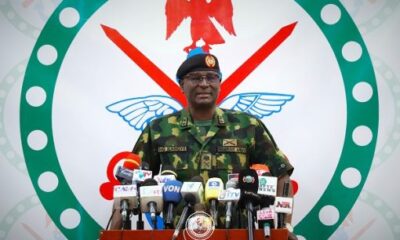

Troops Reject N13.7m Bribe, Kill Bandits In Nationwide Crackdown
-
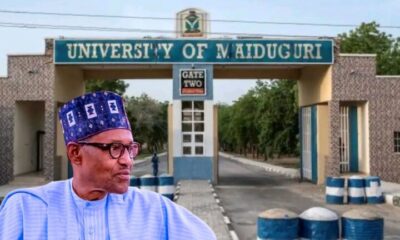

BREAKING: President Tinubu Renames University Of Maiduguri After Buhari
-


CPC Bloc And Buharists Reaffirm Commitment To APC And President Tinubu, Call For Party Chairmanship
-
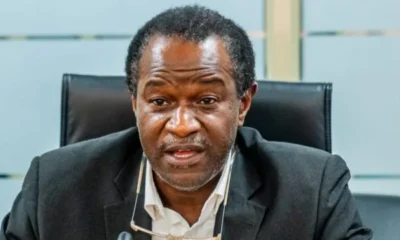

NELFUND To Launch Job Portal Linking Student Loan Beneficiaries To Employers By 2026
-


UK To Reduce Voting Age To 16 In General Elections
BIG STORY
‘The People’s General, The Farmer President’ — Tinubu’s Tribute To Buhari At Special FEC Session [SEE FULL TEXT]
Published
2 hours agoon
July 18, 2025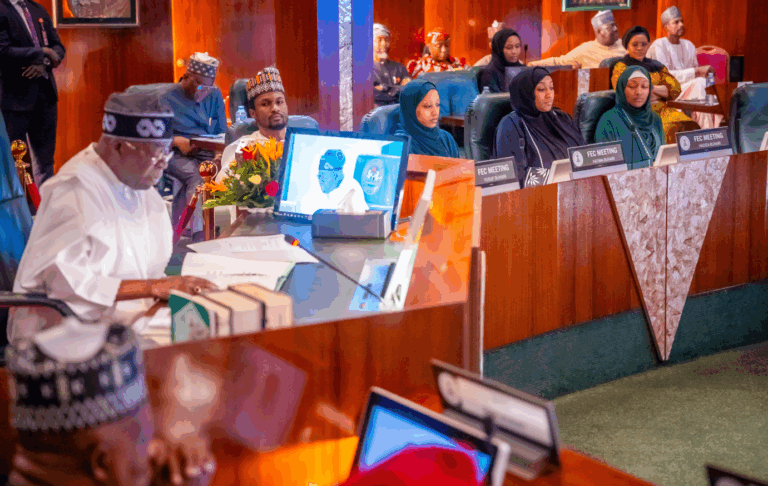
President Bola Tinubu delivered a speech during Thursday’s special federal executive council meeting at the State House in Abuja, held in honour of former President Muhammadu Buhari.
Today, we gather in a moment of stillness, surrounded by the absence left behind by a leader whose presence deeply shaped our nation.
We are here to honour a man who once led this chamber, whose voice called for our best efforts, and whose convictions stood strong against the tide of opinion.
President Muhammadu Buhari, GCFR, former Head of State and President of Nigeria, has passed away.
He was a soldier during war, a calm figure during peace, and a citizen admired not for seeking praise, but for simply being himself.
But it was in private that his greatest strengths were clearest: he was devoted without show, just without being harsh, kind without being sentimental, reserved without being distant, and honest without deception.
His nature was consistent and his spirit steady. He moved with grace and earned the respect of those who encountered him. That inspiration remains with us.
He showed humility toward his equals, gave respectful kindness to those he led, and offered love and loyalty to those close to him. His life challenged wrong and gave shelter to what was right. His moral character gave deeper meaning to the discipline he held in public life.
Even at the end, he kept the calm dignity that marked his life. He met death with the same quiet acceptance of God’s will. This is the man Nigeria mourns today.
President Buhari lived with rare honour. He stayed upright in his values, untouched by the temptations of power, unmoved by applause, and unfazed by the loneliness that often comes with doing what is right over what is popular.
His courage was unspoken, and his integrity needed no announcement. His loyalty to the country showed in action more than words.
His path reflected that of Nigeria. Born before independence, he chose to defend the nation. In war and peace, he showed careful attention and unwavering commitment, as if he believed protecting Nigeria was his life’s purpose.
From his military years to civil service, he remained consistent. He governed the North-Eastern State, led as Head of State, and later managed the Petroleum Trust Fund with firm discipline and focus on national interests.
Still, his most lasting mark came through democracy. At a time when many doubted that change was possible, Muhammadu Buhari placed his hope in the will of Nigerians.
We stood together. With others from across political backgrounds, regions, and languages, we built a coalition that made history with Nigeria’s first true democratic transfer of power from one party to another.
When he became our party’s first elected President, he led with humility, governed with dignity, and carried the responsibilities of leadership with patience.
Those who knew him closely saw that the presidency did not change him. He remained calm in pressure, firm in challenge, humble in victory, and always cheerful in spirit.
After completing his tenure, he returned to Daura. Not to control from behind the scenes, but to live quietly, just as he always had—trusting others to move the nation forward.
President Buhari was not without flaws—no leader is—but he was a good man, a decent man, an honourable man.
His legacy will be discussed, as all legacies are, but the values he brought to public service, the strength of his character, and his incorruptible standards will be remembered. He lived entirely in service to Nigeria and with devotion to God.
Now he rests. And we must remember him not just with words, but with actions: by showing humility in power, integrity in duty, kindness in leadership, and courage in doing what is right.
On Tuesday, July 15, 2025, a grateful nation laid to rest one of its finest sons. It was a deep honour for me and Vice President Kashim Shettima to lead the funeral procession to Daura and witness his burial, which reflected the dignity he deserved.
I thank the Inter-Ministerial Committee, led by Secretary to the Government of the Federation, George Akume, and Governor Dikko Radda, for organising a fitting State Funeral within 48 hours.
As we mourn, I extend my deepest condolences to Hajia Aisha Buhari, her children, the wider Buhari family, the government and people of Katsina State, and to everyone who knew and loved him.
We thank President Buhari’s family for giving him the strength and support to serve Nigeria for more than five decades.
We remember his contributions, reflect on his impact, and pray for peace upon his soul.
Mai Gaskiya, the People’s General, the Farmer President—your duty is complete.
May Almighty Allah forgive his shortcomings and grant him Aljannah Firdaus.
May his life continue to inspire generations of Nigerians to serve with courage, conviction, and selflessness.
President Buhari, thank you. Nigeria will remember you.
Bola Ahmed Tinubu, GCFR
President, Commander-in-Chief of the Armed Forces
Federal Republic of Nigeria
BIG STORY
Troops Reject N13.7m Bribe, Kill Bandits In Nationwide Crackdown
Published
2 hours agoon
July 18, 2025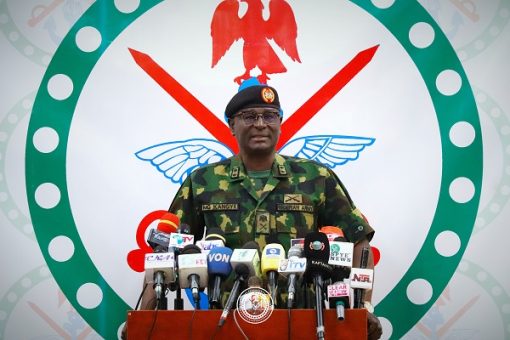
Nigerian troops, in a wide-scale assault on criminal networks, refused a N13.7m bribe from terrorists in Plateau State, killed two bandits during a firefight, and apprehended suspected arms couriers, including members of the National Union of Road Transport Workers, in Borno State.
The Director of Defence Media Operations at the Defence Headquarters, Maj Gen Markus Kangye, revealed this during a press briefing in Abuja on Thursday, detailing military activities across Nigeria between July 9 and 16, 2025.
He explained that troops from Operation Safe Haven responded to a call concerning terrorist activity and intercepted a bullet-riddled vehicle along the Jos–Sanga Road.
According to Kangye, the suspects in the vehicle offered N13,742,000 to secure their release.
The troops turned down the bribe, seizing weapons, ammunition, and cash during the operation.
“On 9 July 2025, our gallant troops intercepted a vehicle with bullet holes along Jos, Sanga Road.
“Suspects attempted to induce troops with monetary gratification, but they declined.
“Troops arrested the two suspects, recovered weapons, ammunition, a vehicle and the sum of N13,742,000 from them. Investigation ongoing while recovered items in troops’ custody,” he said.
He stated that troops also executed offensive maneuvers and responded to multiple emergency calls in Bassa, Barkin Ladi, South Wase, Riyom, and Jos East local government areas of Plateau State, as well as Kaura and Sanga LGAs in Kaduna State.
Routine patrols led to the capture of seven suspected militias and criminals across Barkin Ladi and Jos South LGs in Plateau, and Wamba and Sanga LGs in Nasarawa and Kaduna States.
Confiscated items included additional weapons, ammo, motorcycles, and illegal drugs.
In another action, troops set up an ambush in Nteng, Qua’an Pan LGA of Plateau State, acting on solid intelligence about a potential attack, and eliminated two bandits.
“Within the period July 9-16, 2025, troops of Operation Safe Haven conducted offensive operations and responded to distress calls on terrorists’ activities in Bassa, Barkin Ladi, South Wase, Riyom and Jos East local government areas of Plateau State, as well as Kaura and Sanga local government areas of Kaduna State.
“While conducting these operations, they contacted extremists and killed some of them, arrested 12 and rescued three kidnapped victims.
“Some weapons, ammunition, motorcycles and vehicles were recovered from them.
“Similarly, troops of Operation Safe Haven, while on routine patrol, arrested seven militias/criminals in Barkin Ladi and Jos South LGAs of Plateau State, as well as Wamba and Sanga LGs of Nasarawa and Kaduna states, respectively. Items recovered from them were weapons, ammunition and motorcycles as well as illicit drugs.”
Maj Samson Zhakom, spokesman for the Military Special Taskforce, confirmed the Plateau operation, noting that troops engaged the bandits in a gunfight after setting a trap.
Two bandits were killed, and others escaped with potential injuries. Dangerous weapons and ammunition were seized and are now in military custody, while efforts to apprehend the fleeing suspects continue.
Elsewhere, two members of the NURTW were caught in Biu, Borno State, allegedly transporting military gear to terrorists.
Another major logistics handler was captured in Yobe State, while an IPOB levy collector was apprehended in Anambra with N1.5m.
Kangye said the NURTW members, identified as Isah Abdullahi and Abdullahi Mohammed, were arrested in Liya, Biu LGA of Borno State while accepting a waybill from a truck driver, based on previously gathered intelligence.
“Two members of the National Union of Road Transport Workers identified as Isah Abdullahi and Abdullahi Mohammed were arrested in Liya, Biu LG of Borno State, while receiving waybills from a truck driver, which corresponded with intelligence received earlier on the said consignment.
“The items include 13 pairs of military uniforms and some high-voltage batteries amongst others,” he said.
Kangye added that 65-year-old Shaibu Bulama, another terrorist logistics operator, was detained at Damasak Motor Park in Yobe State on July 13, 2025.
“Some quantities of arms and ammunition were also recovered. They also retrieved and safely detonated some IEDs, while the sum of N17,150,000 was also recovered,” he said.
According to him, 16 relatives of terrorists — four adult women and 12 children — surrendered to troops in Bama LGA of Borno State due to intensified military pressure.
“As a result of sustained military operations in the Northeast theatre, 16 family members of terrorists, including four adult females and 12 children, surrendered to troops in Bama LG on July 14, 2025.
“Preliminary investigations indicate that the group surrendered from Bakura Jega village,” he added.
Kangye also detailed progress in fighting oil theft, stating that Operation Delta Safe troops arrested 42 suspected oil thieves and recovered large volumes of stolen and illegally refined petroleum products in the past week.
Troops reportedly recovered 201,345 litres of stolen crude oil, 29,730 litres of illegal AGO, and 1,759 litres of DPK.
In addition, they discovered and destroyed 18 illegal refining ovens, 32 dugout pits, 16 boats, 21 storage tanks, 17 drums, and 19 refining sites.
“Other items recovered include pumping machines, drilling machines, tricycles, motorcycles, mobile phones and 13 vehicles.
“Furthermore, 42 oil thieves and other criminals were arrested, while assorted arms and ammunition and some explosives were also recovered,” he said.
In another development, troops apprehended a feared cult leader named Prince Johnson Ishirim, also called Commander Junior, along with 13 other criminal and kidnapping suspects in Ahoada East LGA of Rivers, as well as Oshimiri, Warri South and Ukwani LGAs in Delta.
Troops also raided a criminal base in Southern Ijaw LGA of Bayelsa on July 10, capturing 28 oil thieves and drug dealers.
In the South East, Kangye said troops arrested an IPOB tax collector in Ihiala LGA of Anambra State.
The suspect was believed to have been assigned by the separatist group to collect levies from locals.
Troops recovered N1.5m from the apprehended individual.
BIG STORY
BREAKING: President Tinubu Renames University Of Maiduguri After Buhari
Published
15 hours agoon
July 17, 2025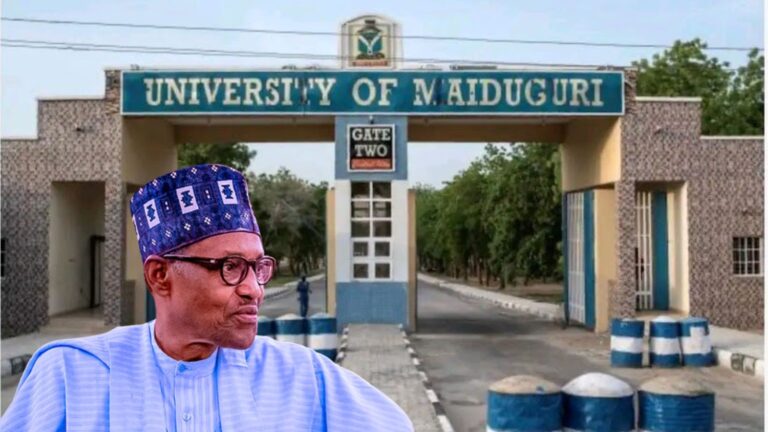
President Bola Tinubu has given approval to rename the University of Maiduguri in Borno State as Muhammadu Buhari University.
May we now adopt the University of the Maduguri as the Muhammadu Buhari University, Tinubu announced at the end of a special Federal Executive Council session held to honour Buhari at the Aso Rock Villa, Abuja, on Thursday.
Earlier, the President offered a heartfelt tribute to Buhari, portraying him as a good man, a decent man, an honourable man, whose legacy of discipline, patriotism, and strong moral values would be remembered for generations.
Tinubu acknowledged that although Buhari had imperfections, his steadfast dedication to serving the nation distinguished him.
President Buhari was not a perfect man, no leader is, but he was, in every sense of the word, a good man, a decent man, an honourable man.
His record will be debated, as all legacies are, but the character he brought to public life, the moral force he carried, the incorruptible standard he represented, will not be forgotten.
His was a life lived in full service to Nigeria, and in fidelity to God, he added.
Looking back at Buhari’s leadership and long career in both military and civil service, Tinubu highlighted his humility, modesty, and resistance to the temptations of power.
He stood, always, ramrod straight; unmoved by the temptation of power, unseduced by applause and unafraid of the loneliness that often visits those who do what is right, rather than what is popular.
His was a quiet courage, a righteousness that never announced itself. His patriotism was lived more in action than in words.
Tinubu also reflected on their political partnership, which led to the historic 2015 elections, marking Nigeria’s first peaceful transition of power between political parties.
We stood together, he and I. Alongside others drawn from across the political spectrum, regions and tongues, we formed an alliance that enabled Nigeria to experience its first true democratic transfer of power from one ruling party to another.
When he was sworn in as our party’s first elected President, he led with restraint, governed with dignity, and bore the burdens of leadership without complaint, he said.
The President admired Buhari’s life after leaving office, saying he chose to live quietly in Daura rather than influence politics from behind the scenes.
When his tenure ended, he returned to Daura; not to command from the shadows or to hold court, but to live as he always had, never seeking to impose his will but content to let others carry the nation forward.
Even in death, he maintained the serenity that defined him in life: not a sigh, not a groan, just a quiet submission to the will of God. Such was the man Nigeria has lost. Such was the man for whom our nation now mourns, he added.
Tinubu expressed gratitude to the Inter-Ministerial Committee and Katsina State Governor, Dikko Radda, for putting together a state funeral in less than 48 hours, calling it a profound honour to lead the burial ceremony in Daura.
He ended his tribute with a final message: Mai Gaskiya, the People’s General, the Farmer President, your duty is done. May Almighty Allah forgive his shortcomings and grant him Aljannah Firdaus. May his life continue to inspire generations of Nigerians to serve with courage, conviction, and selflessness. President Buhari, thank you. Nigeria will remember you.
Buhari passed away on Sunday, July 13, at the age of 82.
Most Popular
-

 BIG STORY4 days ago
BIG STORY4 days agoBREAKING: Federal Government Declares Tuesday Public Holiday To Honour Buhari
-

 BIG STORY3 days ago
BIG STORY3 days agoAmaechi Wears Turban To Buhari’s Burial In Daura
-

 BIG STORY4 days ago
BIG STORY4 days agoOsun 2026: Aregbesola Vows To Unseat Adeleke, Says ADC Will Win Guber Election
-

 BIG STORY24 hours ago
BIG STORY24 hours agoRCCG Pastor Absconds With $8000 Church Money, Abandons Wife, Marries New One
-

 BIG STORY4 days ago
BIG STORY4 days agoECOWAS Caravan 2025 Highlights Barriers, Builds Support For Women In Cross-Border Trade
-

 BIG STORY3 days ago
BIG STORY3 days agoWhat Buhari Told Me About President Tinubu After Fuel Subsidy Removal — Katsina Governor Radda
-

 BIG STORY3 days ago
BIG STORY3 days agoAliko Dangote Submits Paperwork To Build Biggest Seaport In Nigeria
-

 BIG STORY1 day ago
BIG STORY1 day agoKeyamo Faults Atiku’s Use Of Coat Of Arms In PDP Resignation Letter, Says “You Left Office 18 Years Ago”









